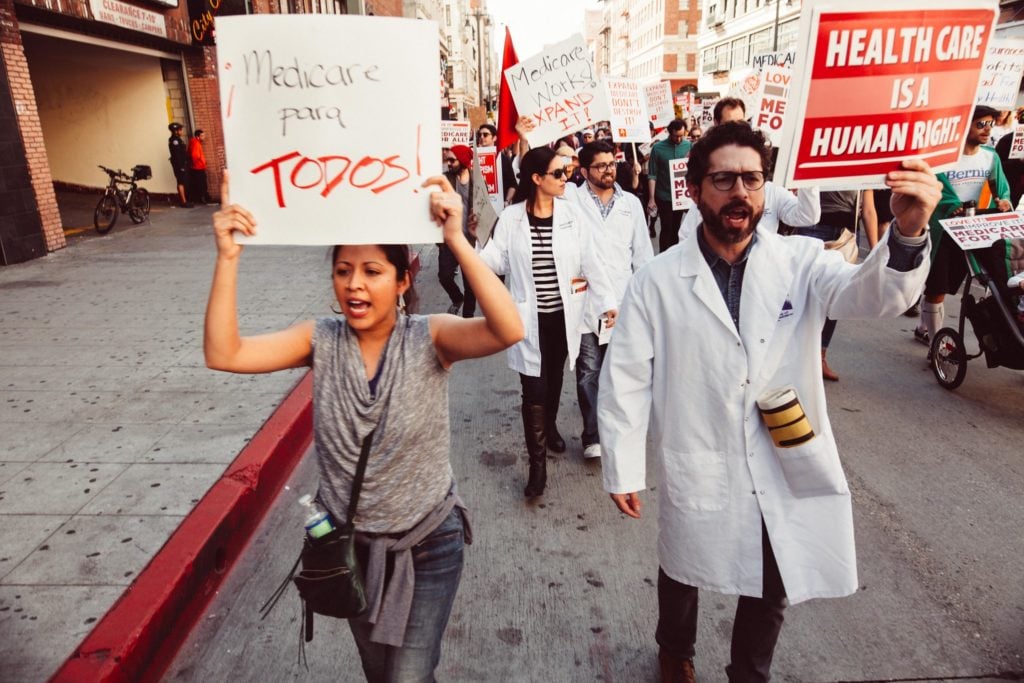The Coronavirus pandemic is affecting everything in this country and around the world: politics, economics, relations between countries and peoples, daily life.
The health of each of us and all our loved ones, and the kind of world we live in post-crisis is on the line. There are many things beyond our control. But what we who are partisans of justice do in the coming weeks can make a huge difference.
Beyond taking precautions to preserve our well-being, our immediate priority is to demand government action that puts people’s health and economic needs ahead of profit, and to take initiative from the bottom up (mutual aid) toward that end. Special attention must be given to the needs of those whose continuing work is essential to public health and meeting society’s basic survival needs, and to those sectors of the population that are most vulnerable. It is urgent to press for the U.S. response to be part of a global effort in cooperation with other countries, while rejecting all racist and xenophobic scapegoating.
See links at the bottom of this column for specific programs, sets of demands and information on all these points.
Even as we immerse ourselves in these solution-driven efforts, we need to engage the political battle that has broken out over why this crisis is as severe as it is, and what that tells us about the structure of U.S. society and the U.S. relationship with the rest of the world. That fight will come to a head in the 2020 election, and progressive organizations engaging that crucial contest are challenged to adjust their message and tactics to be effective in a time when door-to-door canvassing may not be possible.
The President has simply inserted the story of this pandemic into the racist, ‘America First’ frame that has been at the heart of Trumpism’s political narrative from day one. This is the “best prepared” country in the world” fighting off “foreign diseases” that “came out of nowhere” and “nobody anticipated.” America has been saved from disaster only because a patriotic administration was willing to defy “political correctness” and prevent foreigners from infecting us despite the opposition of Democrats espousing their “religion of open borders.”
It is a powerful narrative – and every word is a lie.
Straight out of Orwell’s 1984
The danger of an epidemic like this one was not only foreseen, but the Trump administration itself conducted a preparation exercise in 2019 that indicated how one would likely unfold and why immediate action would make a huge difference.
That exercise, and reports on previous epidemics from the Obama and other administrations, revealed both glaring weaknesses on U.S. preparedness and the need for urgent action at the first signs of any outbreak.
Despite these warnings, the administration took none of the key actions needed to prevent the spread of COVID-19 for two crucial months. Instead the Trumpists downplayed the danger and dismissed warnings as “alarmist” or as propagation of a “hoax.” As late as March 7, Trump declared “I’m not concerned at all. No, we’ve done a great job.”
The “blame China” line is simply the latest instance of racist blame-shifting in a long history of U.S. leaders utilizing this tactic to cover up their own failures to secure public health.
Bottom line, everything Trump did and did not do from late January until mid-March made both the public health and economic consequences of the COVID-19 outbreak qualitatively worse.
And then on March 17, Trump abruptly shifted his story, denying that he had ever downplayed the danger of the Coronavirus and claiming that “I’ve always known this is a real, this is a pandemic, I’ve felt it was a pandemic long before it was called a pandemic.”
The deadly consequences of Trump’s denialism will be measured in the coming weeks. His turnabout at least begins to activate some much-needed government measures, but on the level of narrative it is an order-of-magnitude escalation of the Trumpist war on facts. It is straight out of George Orwell’s dystopian novel, 1984. History is what I say it is. If I say so, two plus two equals five.
Trump is testing out the claim he made in January 2016: “I could stand in the middle of Fifth Avenue and shoot somebody and I wouldn’t lose any voters.”
This battle between totally different explanations of what has occurred in the last three months is not just a fight over the past. It is an integral part of the battle to shape the future. For after this pandemic, this country – and the world – will not be the same.
No going back to the old normal
Even before the current crisis, people across the political spectrum were demanding change. The political and economic structure of the country had lost much of its legitimacy. Inequality was rampant. The effects of climate change were mounting and spurring a new youth-led movement worldwide. Mainstream economists were warning of instability in the global financial system.
The country was polarized along racial, political, generational, geographical (urban-suburban-rural) and even basic information-source lines over what direction to go to make things better. The only certainty was that big changes were going to come.
The current pandemic will both accelerate that change and push it further in one or another direction.
COVID-19 is heightening the life-and-death consequences of economic, racial and other forms of inequality.
The economic crisis, which like the COVID-19 infection rate is still in its early stages, is already raising survival and structural issues for entire industries and for tens of millions of workers. Will the small and medium sized brick-and-mortar sector be wiped out? What is going to happen to the gig economy and the workers in that sector who generally lack benefits and even the most minimal job security? Who will get bailed out this time and who won’t? Will the biggest financial firms and corporations with their insider connections to the Trump administration and their armies of lobbyists gain further wealth and power as they did in the 2008 crisis?
And in politics: Pandemics, like other crises, tend to strengthen the power of incumbent regimes which have any capacity to take measures, even half-hearted ones, that address people’s fears and provide some relief. Power and authority are often further centralized; calls to “put politics aside” and rally behind the government tend to have at least short-term appeal. More people than usual are open to reducing civil liberties and rights in order to “fight the crisis.”
In today’s U.S. context, the Trump administration – already oriented toward strongman rule and entrenching a racist authoritarian state – will try to turn all these potentials to their advantage.
So what was already a high-stakes battle is accelerated and intensified.
Trumpishm entrenched vs. starting down a different path
Will immediate executive policies and legislation further entrench class, racial, gender and generational inequality and the special hardships faced by people with disabilities, the homeless and the incarcerated? Or can we force them to go in the direction of protecting the health and well-being of workers and the vulnerable?
Will the economy be restructured in a way that means even more corporate and 1% domination? Or will a popular majority be able to forestall another burst of “disaster capitalism” and force steps toward a people-before-profits arrangement?
Will this crisis lead to greater global conflict, with heightened U.S. bullying and aggression against China, Iran, Cuba and other countries? Or can we make progress toward international cooperation in the face of threats like pandemics, climate change and war that threaten the entire human race?
And will Trump and his enablers be able to use this crisis to move closer to their goal of long-term authoritarian rule by a reactionary white supremacist bloc? Or will their bid for greater power be stopped by an activated majority who want to expand, not diminish, democracy and embrace visions of a social system of equality, justice and environmental sanity?
What radicals and progressives do in the days ahead will have an outsize impact on these fights, and on the 2020 election in particular. We need to not just maintain but expand the capacity, reach and unity of all the organizations, project and institutions that make up the social justice ecosystem for the 2020 battle and the long-haul fight beyond.
In the wake of setbacks to Bernie Sanders’ campaign, it seems likely that the immediate post-November alternative to Trumpism remaining in power will not be an administration anchored in the progressive camp. But we will be in a period of “the center cannot hold’ instability where going back to a pre-COVID-19 world is impossible. On post-pandemic terrain, any administration that comes into power based on opposition to Trump will be subject to pressure from the left under fertile conditions for large-scale structural change.
As we protect one another, we can make a big difference in the shape of the response to the current crisis, in the outcome in November, and in the big battles that will follow.
Despite Donald Trump and Orwell’s Big Brother, two plus two equals four.
Resources: Action programs and strategies to fight the pandemic and economic crisis
Bernie Sanders Emergency Plan, by Jon Queally on Common Dreams
A Moral Response to COVID-19, from Rev. William Barber and Dr. Liz Theoharis, Co-Chairs, The Poor People’s Campaign
Time to Sharply Ramp Up Health Care Capacity, from National Nurses United
We Demand a COVIOD-19 Response that Puts People before Profit, from Democratic Socialists of America
COVID-19 Pandemic Resources, from the AFL-CIO
In Coronavirus Fight, Workers Are Forging an Emergency Green New Deal, by Jeremy Brecher, Labor Network for Sustainability
Support for Workers – Take Action – Donate, from the National Domestic Workers Alliance
The Mobilization that Must Start Now, By James K. Galbraith in The Nation
Shaping Change Together, from the Grassroots Global Justice Alliance
We Can’t Stop Coronavirus without Confronting Rightwing Nationalism, by Tobita Chow on Organizing Upgrade
Union Leader Sara Nelson on Airline Relief; What Workers Have Already Won in the Face of Coronavirus, and much more, in Working In These Times, edited by Hamilton Nolan
Silent Streets: The Homeless, the Financially Desperate, and Essential Services Carry On, by Al Neal in The People’s World
Imprisoned People, COVID-19 and Insight from Behind the Walls, on Organizing Upgrade
Social Distancing and Crip Survival: A Disability Centered Response to COVID-19, from Sins Invalid
The Coronavirus Is Upending the Census, by Igor Derysh reposted from Salon on Alternat
Cancel the Rent, from the Right to the City Alliance
The Biden Plan to Combat COVID-19 and Prepare for Future Global Health Threats, from Joe Biden
Trump’s Trickle-Down Economic Plans Are Not Enough, Joseph Stiglitz interviewed by Amy Good man on Democracy Now
Photo Credit: Molly Adams, CC-BY 2.0

